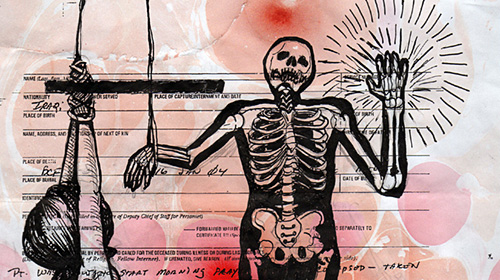
Artist's Work Keeps Human Realities of Torture Alive
Last autumn, , a Berlin-based American artist, joined the ACLU as an artist-in-residence. Working out of our New York headquarters, Kahlon furthered an on-going project of hers called Did You Kiss the Dead Body? Visualizing Absence in the Archive of War. This week, she launched a new website compiling her stunning original as well as and with ACLU staff: .
In response to a series of Freedom of Information Act (FOIA) requests in the years following 9/11, the ACLU obtained more than 130,000 pages of official government records, now searchable in a recently updated website known as the . Kahlon's work focuses on a subset of these records consisting of U.S. military death certificates and autopsy reports for Iraqi and Afghan men who died while in American detention centers.

Check out the slideshow Did You Kiss the Dead Body? by Rajkamal Kahlon
"These documents created a strong emotional and physical response in me, prompting both nausea and grief," Kahlon says. The texts, she explains, "highlight relations of abuse and power through descriptions of anonymous Iraqi and Afghan male prisoners, young and old, that have died in U.S. custody." In 2009, Kahlon began incorporating some of these documents into in an effort to augment "the secular archive with alternate forms of remembrance and mourning in order to make the fact of these incarcerations and deaths gain greater significance in our cultural memory."
Her images consist of a series of ink anatomical drawings on marbled autopsy texts; both techniques used carry deep symbolic meaning for Kahlon. "Marbling, with its origins in Iran and Turkey, is employed in the context of this project as a visual referent to the internal body," Kahlon explains. "The European anatomical illustrations provide a second and simultaneous view of the inner and outer body and create another circuit of meaning that is endlessly looped between the text and image."

In Spring 2011, Kahlon met National Security Project Staff Attorney Alexander Abdo at a Lambent Foundation seminar titled Aesthetic Justice, and the two began a conversation that eventually led to Kahlon's residency. While at the ACLU, Kahlon interviewed attorneys and human rights researchers who have been engaged in torture accountability work over the past decade. The 40 interview segments published on the new website address a wide variety of issues, including: Guantánamo; race and torture; a brief history of the FOIA law; targeted killings; and the limits and possibilities of human rights litigation as a tool for accountability.
For Kahlon, a key question raised by these documents was, "How do the lives of the men in these documents come to be remembered and brought into our shared history?"
"As an artist," Kahlon notes, "part of my logic is that the documents perform a second stage of violence to the body that has already experienced incarceration and death, further subjected to dismemberment and scrutiny. The documents are contained within an archive, which serves a secular memorial function, erasing rather than helping us to remember these excesses of power." Yet, Kahlon notes, "from a legal standpoint, the documents serve as proof of the excesses of power, providing the possibility to hold those in power accountable for their acts."

The significance of Kahlon's work, and the work of other artists committed to addressing egregious human rights violations like torture and extraordinary rendition, cannot be overstated. The creation of an official record comprised of government documents is necessary but by no means sufficient for achieving accountability for such abuses.
Artists like Kahlon, by converting sterile records into works that represent the lived horrors of torture, shape cultural memory and can help shift public debate. Their images evoke visceral reactions and provide new spaces for meaningful conversations about memory, accountability, humanity, and loss.
Learn more about torture and other civil liberty issues: Sign up for breaking news alerts, , and .

